人教版九年级全册 Unit 10 You're supposed to shake hands Section B(1a-1d)课件(共23张PPT,内嵌音频)
文档属性
| 名称 | 人教版九年级全册 Unit 10 You're supposed to shake hands Section B(1a-1d)课件(共23张PPT,内嵌音频) | 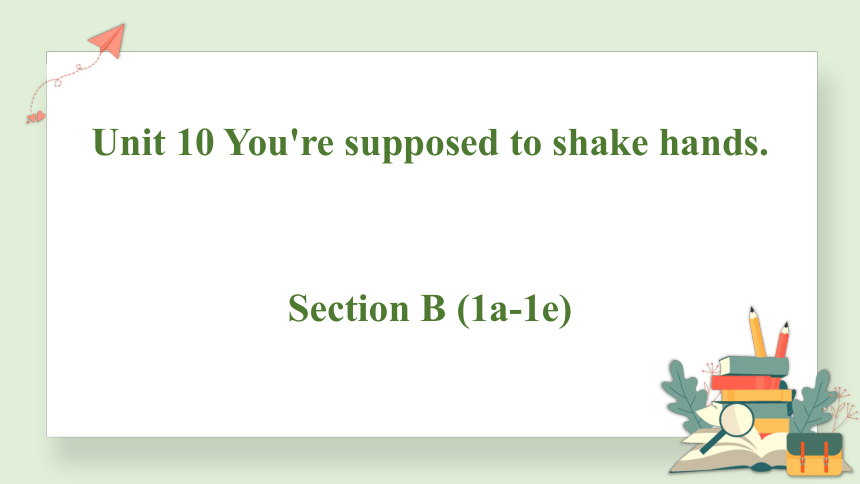 | |
| 格式 | pptx | ||
| 文件大小 | 2.6MB | ||
| 资源类型 | 教案 | ||
| 版本资源 | 人教新目标(Go for it)版 | ||
| 科目 | 英语 | ||
| 更新时间 | 2022-11-19 14:47:31 | ||
图片预览

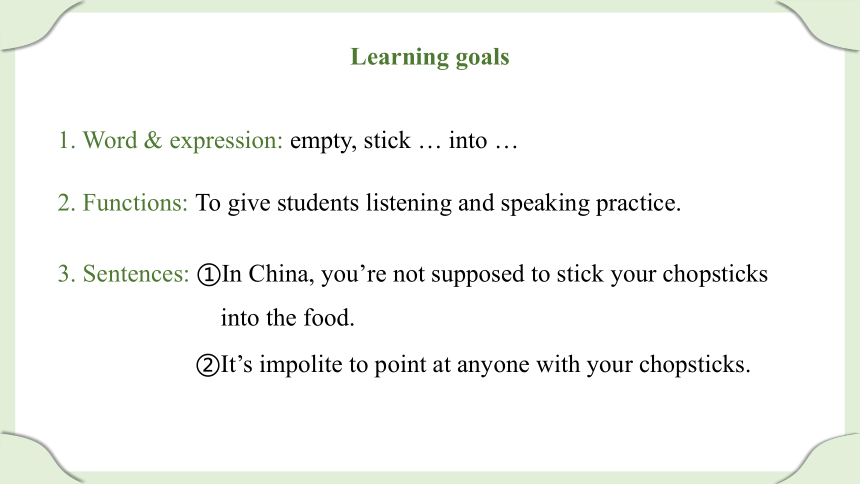
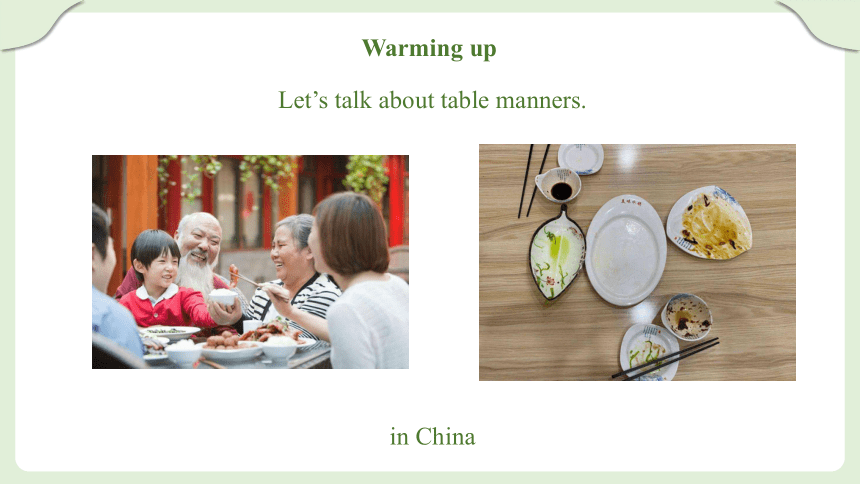
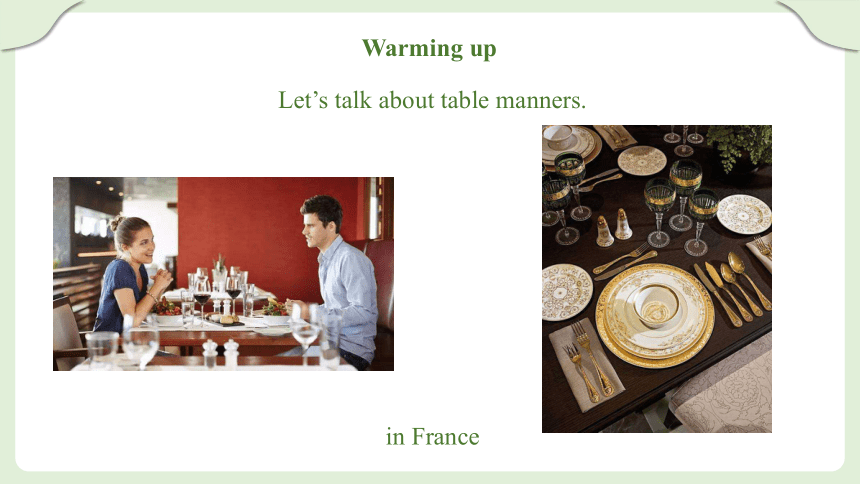
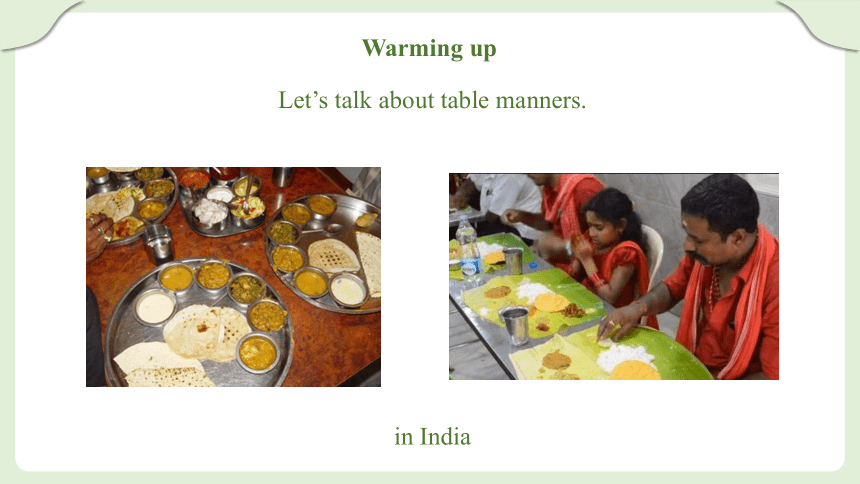
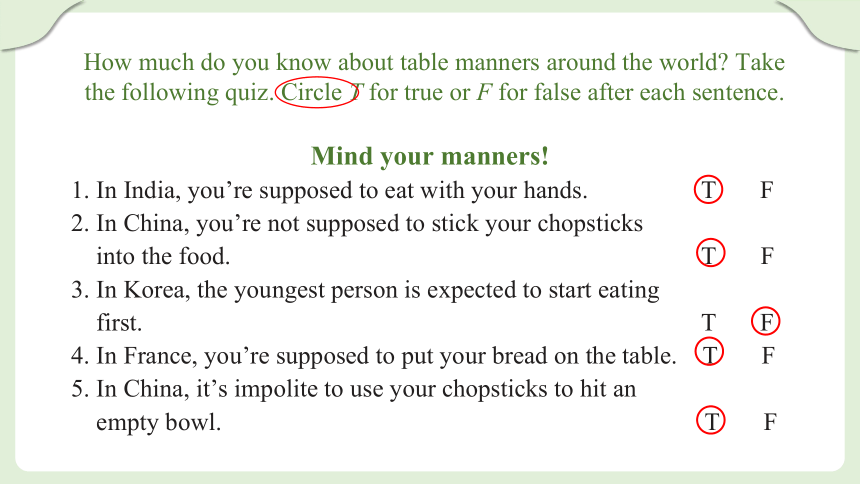
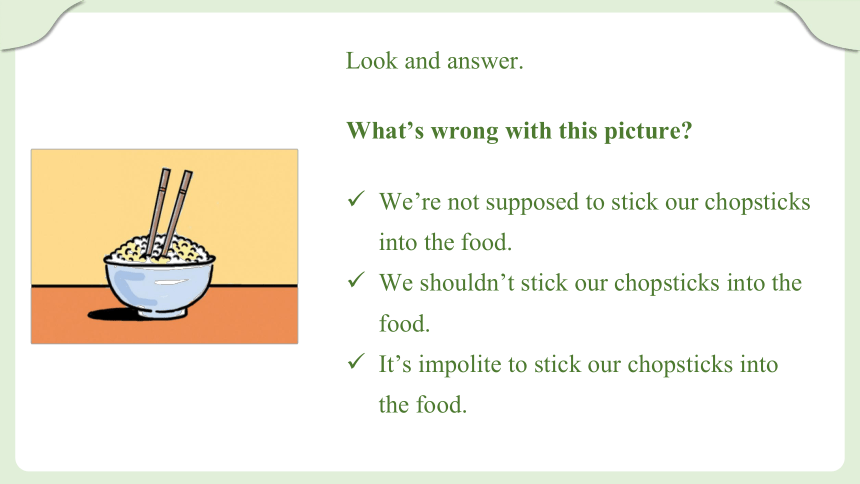
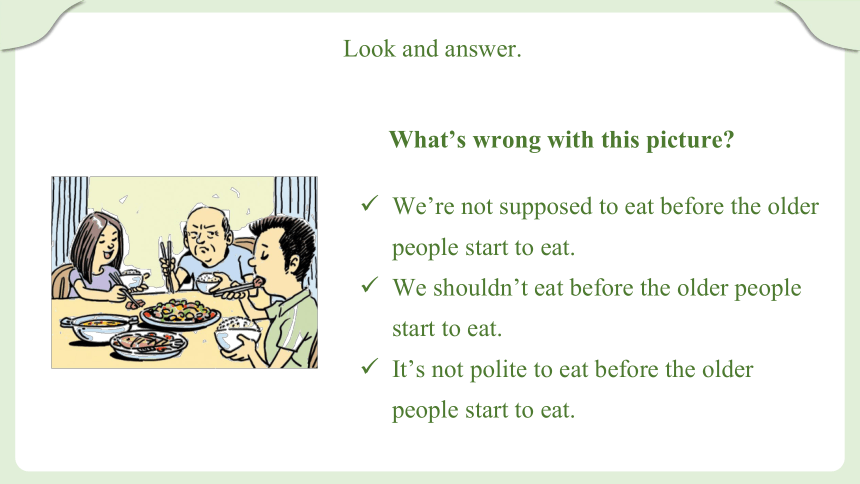
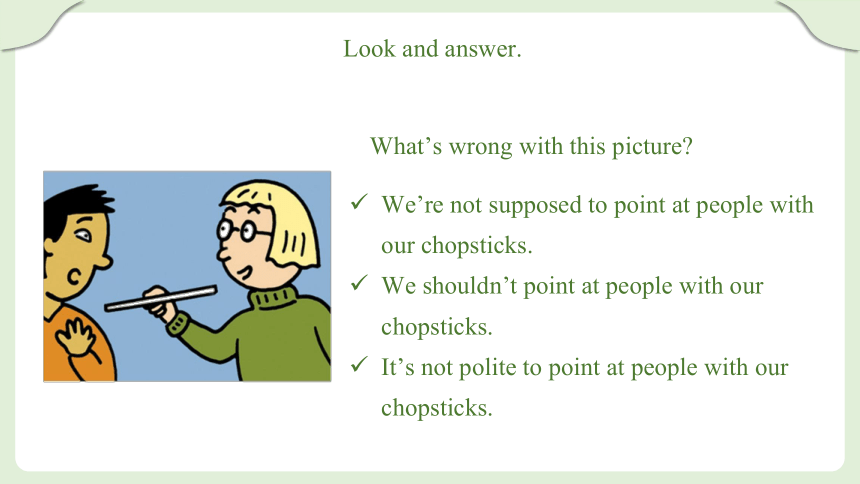
文档简介
(共23张PPT)
Section B (1a-1e)
Unit 10 You're supposed to shake hands.
Learning goals
3. Sentences: ①In China, you’re not supposed to stick your chopsticks
into the food.
②It’s impolite to point at anyone with your chopsticks.
2. Functions: To give students listening and speaking practice.
1. Word & expression: empty, stick … into …
Warming up
Let’s talk about table manners.
in China
Warming up
Let’s talk about table manners.
in France
Warming up
Let’s talk about table manners.
in India
How much do you know about table manners around the world Take the following quiz. Circle T for true or F for false after each sentence.
Mind your manners!
1. In India, you’re supposed to eat with your hands. T F
2. In China, you’re not supposed to stick your chopsticks
into the food. T F
3. In Korea, the youngest person is expected to start eating
first. T F
4. In France, you’re supposed to put your bread on the table. T F
5. In China, it’s impolite to use your chopsticks to hit an
empty bowl. T F
Look and answer.
What’s wrong with this picture
We’re not supposed to stick our chopsticks into the food.
We shouldn’t stick our chopsticks into the food.
It’s impolite to stick our chopsticks into the food.
What’s wrong with this picture
We’re not supposed to eat before the older people start to eat.
We shouldn’t eat before the older people start to eat.
It’s not polite to eat before the older people start to eat.
Look and answer.
What’s wrong with this picture
We’re not supposed to point at people with our chopsticks.
We shouldn’t point at people with our chopsticks.
It’s not polite to point at people with our chopsticks.
Look and answer.
1b Steve is going to China to study.
His friend Yang Ming is telling him about the table manners in China.
Listen and number the pictures in the order you hear them.
1
2
3
_____ 1. You’re not supposed to ... a. stick your chopsticks into
your food.
_____ 2. It’s impolite to ... b. point at anyone with your
chopsticks.
_____ 3. You shouldn’t ... c. start eating first if there are
older people at the table.
1c Listen again. Match these sentence parts.
a
b
c
in China in America
You are not supposed to start eating first if there are older people at the table. _________________________
It’s impolite_____________________ ________________________________ No. Use forks and knives.
You shouldn’t ___________________ _______________________________ No.
You can talk when you’re eating food. It’s not polite to talk with your mouth full.
Listen again. Fill in the chart.
to stick your chopsticks into your food.
point at anyone with your chopsticks.
It doesn’t matter.
Yang Ming: You must be excited about leaving for China tomorrow, Steve!
Steve: Yeah, but I’m a little nervous, too.
Yang Ming: Why
Steve: Well, for one thing, I don’t know how to use chopsticks very
well … and I don’t know how to behave at the dinner table.
Yang Ming: Oh, I see. Well, one important thing is that you’re not
supposed to start eating first if there are older people at the table.
Steve: That’s interesting. In the United States, it doesn’t matter.
Listen and read.
Yang Ming: Yeah, I know. It’s also impolite to stick your chopsticks into
your food. You shouldn’t point at anyone with your
chopsticks, either.
Steve: Oh, OK.
Yang Ming: Oh, and there’s one more thing you need to know. You’re
not supposed to talk when you’re eating dinner. Only
parents are expected to talk at the dinner table. Children are
not allowed to speak.
Steve: Wow! That’s ... that’s unusual!
Yang Ming: Haha, I’m just kidding!
Listen and read.
Make a conversation according to the information in 1b & 1c.
In China, you’re not supposed to start eating first if there are older people at the table. What about in your country
In the United States, it doesn’t matter.
1c Talk about other table manners in your country.
We’re supposed to …
Yes, and it’s impolite to …
In China, it’s impolite to use your chopsticks to hit an empty bowl.
在中国,用筷子打空碗是不礼貌的。
empty adj. 空的;空洞的
empty作形容词,具体用法如下:
(1)意为“空的”(本句用法),其反义词为full(满的)。此时可作表语或定语。
Bob wanted to get something to eat from the fridge, but found it empty.
He feels lonely in the empty house.
(2)意为“空洞的”,通常只用在名词前作定语。
His empty speech was boring.
Language points
【拓展延伸】
(1)empty作形容词,还可意为“空虚的”,常用来形容人的感情。
After she died, I stayed alone in her room, with an empty heart.
(2)empty还可作动词,意为“倒空;清空”。其反义词为fill(装满)。
Forget the worries of everyday life and empty the mind.
Language points
Summary
Sentences
①In China, you’re not supposed to stick your chopsticks into the food.
②It’s impolite to point at anyone with your chopsticks.
empty, stick … into …
Word & expression
Functions
To give students listening and speaking practice.
Exercises
用所给词的适当形式填空
1. Jim started _______________ (learn)English as I got there.
2. Many Chinese like to eat with ___________(chopstick).
3. I think he is ____________ (polite)than you by watching you so long.
4. The old man ________ (point)at the young man angrily and didn’t say anything.
5. This book is ________ (use)to do his homework.
learning/to learn
chopsticks
more polite
pointed
used
根据汉语意思完成句子
1. 不要拿筷子指着别人。
Don’t _________ ______ others with your chopsticks.
2. 使用你的筷子敲空碗是很不礼貌的。
_____ _______ ______ use your chopsticks to hit an empty bowl.
3. 你应该先对他们打招呼。
You ______ _________ _____ say hello to them first.
point at
It’s impolite to
are supposed to
Exercises
Homework
1. Write something about the table manners in China, using be supposed to or it’s polite/impolite/important ...
e.g. In China, it’s important to know how to behave at the dinner table. You’re supposed to …
2. Preview the new words and phrases in Section B (P 78-79).
Section B (1a-1e)
Unit 10 You're supposed to shake hands.
Learning goals
3. Sentences: ①In China, you’re not supposed to stick your chopsticks
into the food.
②It’s impolite to point at anyone with your chopsticks.
2. Functions: To give students listening and speaking practice.
1. Word & expression: empty, stick … into …
Warming up
Let’s talk about table manners.
in China
Warming up
Let’s talk about table manners.
in France
Warming up
Let’s talk about table manners.
in India
How much do you know about table manners around the world Take the following quiz. Circle T for true or F for false after each sentence.
Mind your manners!
1. In India, you’re supposed to eat with your hands. T F
2. In China, you’re not supposed to stick your chopsticks
into the food. T F
3. In Korea, the youngest person is expected to start eating
first. T F
4. In France, you’re supposed to put your bread on the table. T F
5. In China, it’s impolite to use your chopsticks to hit an
empty bowl. T F
Look and answer.
What’s wrong with this picture
We’re not supposed to stick our chopsticks into the food.
We shouldn’t stick our chopsticks into the food.
It’s impolite to stick our chopsticks into the food.
What’s wrong with this picture
We’re not supposed to eat before the older people start to eat.
We shouldn’t eat before the older people start to eat.
It’s not polite to eat before the older people start to eat.
Look and answer.
What’s wrong with this picture
We’re not supposed to point at people with our chopsticks.
We shouldn’t point at people with our chopsticks.
It’s not polite to point at people with our chopsticks.
Look and answer.
1b Steve is going to China to study.
His friend Yang Ming is telling him about the table manners in China.
Listen and number the pictures in the order you hear them.
1
2
3
_____ 1. You’re not supposed to ... a. stick your chopsticks into
your food.
_____ 2. It’s impolite to ... b. point at anyone with your
chopsticks.
_____ 3. You shouldn’t ... c. start eating first if there are
older people at the table.
1c Listen again. Match these sentence parts.
a
b
c
in China in America
You are not supposed to start eating first if there are older people at the table. _________________________
It’s impolite_____________________ ________________________________ No. Use forks and knives.
You shouldn’t ___________________ _______________________________ No.
You can talk when you’re eating food. It’s not polite to talk with your mouth full.
Listen again. Fill in the chart.
to stick your chopsticks into your food.
point at anyone with your chopsticks.
It doesn’t matter.
Yang Ming: You must be excited about leaving for China tomorrow, Steve!
Steve: Yeah, but I’m a little nervous, too.
Yang Ming: Why
Steve: Well, for one thing, I don’t know how to use chopsticks very
well … and I don’t know how to behave at the dinner table.
Yang Ming: Oh, I see. Well, one important thing is that you’re not
supposed to start eating first if there are older people at the table.
Steve: That’s interesting. In the United States, it doesn’t matter.
Listen and read.
Yang Ming: Yeah, I know. It’s also impolite to stick your chopsticks into
your food. You shouldn’t point at anyone with your
chopsticks, either.
Steve: Oh, OK.
Yang Ming: Oh, and there’s one more thing you need to know. You’re
not supposed to talk when you’re eating dinner. Only
parents are expected to talk at the dinner table. Children are
not allowed to speak.
Steve: Wow! That’s ... that’s unusual!
Yang Ming: Haha, I’m just kidding!
Listen and read.
Make a conversation according to the information in 1b & 1c.
In China, you’re not supposed to start eating first if there are older people at the table. What about in your country
In the United States, it doesn’t matter.
1c Talk about other table manners in your country.
We’re supposed to …
Yes, and it’s impolite to …
In China, it’s impolite to use your chopsticks to hit an empty bowl.
在中国,用筷子打空碗是不礼貌的。
empty adj. 空的;空洞的
empty作形容词,具体用法如下:
(1)意为“空的”(本句用法),其反义词为full(满的)。此时可作表语或定语。
Bob wanted to get something to eat from the fridge, but found it empty.
He feels lonely in the empty house.
(2)意为“空洞的”,通常只用在名词前作定语。
His empty speech was boring.
Language points
【拓展延伸】
(1)empty作形容词,还可意为“空虚的”,常用来形容人的感情。
After she died, I stayed alone in her room, with an empty heart.
(2)empty还可作动词,意为“倒空;清空”。其反义词为fill(装满)。
Forget the worries of everyday life and empty the mind.
Language points
Summary
Sentences
①In China, you’re not supposed to stick your chopsticks into the food.
②It’s impolite to point at anyone with your chopsticks.
empty, stick … into …
Word & expression
Functions
To give students listening and speaking practice.
Exercises
用所给词的适当形式填空
1. Jim started _______________ (learn)English as I got there.
2. Many Chinese like to eat with ___________(chopstick).
3. I think he is ____________ (polite)than you by watching you so long.
4. The old man ________ (point)at the young man angrily and didn’t say anything.
5. This book is ________ (use)to do his homework.
learning/to learn
chopsticks
more polite
pointed
used
根据汉语意思完成句子
1. 不要拿筷子指着别人。
Don’t _________ ______ others with your chopsticks.
2. 使用你的筷子敲空碗是很不礼貌的。
_____ _______ ______ use your chopsticks to hit an empty bowl.
3. 你应该先对他们打招呼。
You ______ _________ _____ say hello to them first.
point at
It’s impolite to
are supposed to
Exercises
Homework
1. Write something about the table manners in China, using be supposed to or it’s polite/impolite/important ...
e.g. In China, it’s important to know how to behave at the dinner table. You’re supposed to …
2. Preview the new words and phrases in Section B (P 78-79).
同课章节目录
- Unit 1 How can we become good learners.
- Section A
- Section B
- Unit 2 I think that mooncakes are delicious!
- Section A
- Section B
- Unit 3 Could you please tell me where the restroom
- Section A
- Section B
- Unit 4 I used to be afraid of the dark.
- Section A
- Section B
- Unit 5 What are the shirts made of?
- Section A
- Section B
- Review of Units 1-5
- Unit 6 When was it invented?
- Section A
- Section B
- Unit 7 Teenagers should be allowed to choose their
- Section A
- Section B
- Unit 8 It must belong to Carla.
- Section A
- Section B
- Unit 9 I like music that I can dance to.
- Section A
- Section B
- Unit 10 You're supposed to shake hands.
- Section A
- Section B
- Review of Units 6-10
- Unit 11 Sad movies make me cry.
- Section A
- Section B
- Unit 12 Life is full of the unexpected
- Section A
- Section B
- Unit 13 We're trying to save the earth!
- Section A
- Section B
- Unit 14 I remember meeting all of you in Grade 7.
- Section A
- Section B
- Review of Units 11-14
